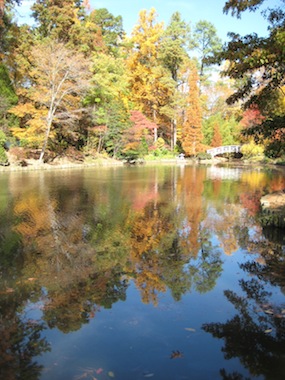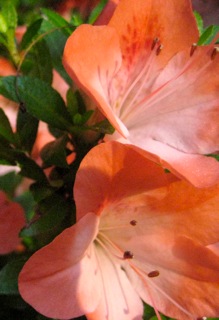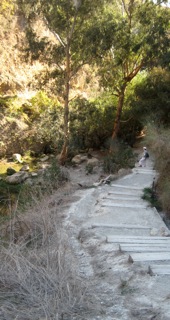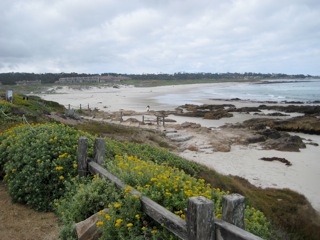Celebrating and Finding Meaning in the Mundane
November, 2011 (Edited 4.2014)
Albert Einstein said, “I believe that a simple and unassuming life is good for everybody, physically and mentally.”
Friday, the beginning of the weekend in Israel, was a lovely fall day here in Jerusalem. As I was on the home stretch of a walk I was feeling very grateful for what was both a surprising and delightful experience that I’d just had, and I decided that I’d like to share this with you.
It was only an hour before that I had set out, with a bit of a headache from the end of a cold. I knew a walk couldn’t hurt, and that it would be good to get some fresh air in me, but I have to admit that part of me would have been equally content to put my feet up and relax. I am so glad that I was able to listen to the part that wanted to go for a walk.
So off I went in the direction of a weekly farmer’s market/craft’s fair, and what I’d seen advertised as “The Flood Festival.” In honor of the week’s Torah portion on Noah, the festival was billed as a celebration of Judaism and the Environment. I was curious, and summoned up the energy to make my way to the fair site.
What a delight I experienced upon entering the site. The fair was on the site of Jerusalem’s Nature Museum, a place I’d not previously visited. I often feel as though I’m a country girl who’s out of place in the city (though I also love and appreciate all that this city that I feel privileged to live in has to offer.) Suddenly I felt as though I was out in the country- even though I was a mere 15 minute walk from home.
I spotted a young girl standing at a concrete wall carefully painting colorful figures on the wall. A man who looked to be her father was standing nearby watching her work with what appeared to be warm approval. While I also admired her painting, it was the overall scene that touched me more. Walking further, I marveled at the beauty of the setting. I felt as though I was far away from the city, as though suddenly transported to a magical scene in a delightful rural area.
There were musicians playing, an actor dressed up as a biblical character (Noah?) walking about on stilts and interacting with some of the children, and booths selling organic produce, quality wines, baked goods, and more. And models of all sorts of arks, made from a variety of materials- each one distinct and so creative.
I enjoyed a conversation with the organic farmer from whom I bought some vegetables that themselves appeared to me to be works of art; wandered in an area in which plants were being cultivated for sale in order to benefit mental health services in the city and delighting in all the varieties of herbs and flowering plants being grown there; saw demonstrations of various technologies and products designed to preserve the environment- a cause close to my heart.
So, why am I writing all of this? To attempt to convey the wonder I felt at finding a treasure where (and when) I didn’t expect to find one. What felt so surprising and special to my eyes and sensibilities was, I realize, in a sense quite basic. Delighting in the feeling of the earth beneath my feet. Reveling in the fresh Fall weather, and the sharing of the special fair-like atmosphere evoked by this down-to-earth festival.
To me, this experience felt like a special treat as well as being an example of a pleasure that is freely available to us when we can slow down enough to be able to appreciate that which is simple, and often mundane as well. Below I’ll discuss some ways that you might facilitate your own ability to enjoy the simple, and find meaning in the mundane, even within your busy, modern life-style. As Leonardo DaVinci’s remarked, “Simplicity is the ultimate sophistication.”
The power of simplicity, and how attitude or perspective can help
Einstein also said that “everything should be made as simple as possible, but not simpler.” We might readily agree to this statement when it comes to certain aspects of our lives, but then quickly assert that it is overly simplistic, or not relevant to the more complex lives that most of us live.
In my experience with clients, students- and myself- I’ve noticed that what most often seems to get in the way of having and living simpler lives is somehow related to fear: fear of what would happen if we were to follow our hearts, or to let go of some emotion, some activity, some relationship, some object – something in our lives that may not only no longer be serving us, but may actually in some way be getting in the way of our living fulfilling, vital and happy lives.
Here is where Focusing can be life changing. By sitting quietly with the places in us that have fears, sitting with an attitude of compassion, acceptance, patience- those qualities that engender a sense of safety both in others and within our own beings- we are able to better understand the nature of these fears, not in a cognitive, analytical way that we might arrive at through thinking alone, but on an experiential level that more closely approaches the essence of what might be true for us inside.
The word attitude often has negative connotations. When I was growing up, I remember being told to “change my attitude.” What this usually meant was that I should feel something other than what I was feeling, the implication being that some emotions are more acceptable than others.
I like what Miriam Greenspan wrote about this subject in the Spring 2011 issue of Ode Magazine:
“…It’s not really the emotions that are negative- it’s our attitude toward them…. The key to whether dark emotion becomes destructive or transformative is whether we can do what Jung says: Make the darkness conscious. Emotional mindfulness- the ability to stay fully attentive and befriend unwelcome emotions where they live, in the body- is essential to emotional alchemy, the process by which the lead of our worst feelings can be transmuted to golden spiritual power and wisdom….”
I agree with Greenspan’s statement that it is not our emotions that are negative, but rather the attitudes that we hold that can have a negative effect on our feeling of these emotions. In Focusing we welcome all feelings, making a conscious effort to have an attitude of curiosity, compassion, acceptance, spaciousness, patience, kindness- and more- toward whatever comes within us.
When Focusing, when we experience fear, we first acknowledge it, and then welcome it, having the attitude that it must have some good reason for being there. In doing so, the outcome will inevitably be different than when we attempt to ignore it, pretend that it isn’t there, or disparage it with judgment or criticism. These approaches don’t work in the long term- and generally not in the short term either.
Want to know more? Here’s a link to an article I wrote on Focusing that was published in the Jewish Press. The final section of this article provides a list of steps that you can use to get a taste of Focusing for yourself.
Ready to learn this process that facilitates lasting growth, change, and inner peace for yourself? Please see the schedule on the right and choose a class that works for you. Then just send me an email and I’ll send you the information necessary to sign you up. If you don’t see a day/time that works for you, please let me know so that I might plan a class that will work for you.
For those who’ve completed Level One and are ready to deepen your learning of how to connect more fully with your own inner self, as well as to begin to facilitate the process for others, you can learn more about advanced classes here.
Deepening our understanding & appreciation of the mundane through the Jewish Calendar
The Jewish Calendar is rich with symbolism. We are currently in the month of Cheshvan. This month is often thought of as the month without holidays, the month that comes between the high holy days in the month of Tishrei, and Chanukah in Kislev.
Cheshvan heralds the beginning of the winter rains in the northern hemisphere. Days are growing shorter and colder, prompting us to spend more time indoors. Like the astrological symbol of this month, the scorpion, that burrows into the earth, this is a time that we are prompted to turn inward within ourselves.
 According to The Book of Formation (in Hebrew, Sefer Yetzirah,) each month of the Hebrew year has a sense associated with it. The sense associated with Cheshvan is action, indicating that even though this might be an “in between” month in the sense of holidays, and a month in which we are prompted to turn inward, it is an important time in its own rite. Likewise, inner directed attention does not mean a time for maintaining the status quo, for passivity, but rather a time of action.
According to The Book of Formation (in Hebrew, Sefer Yetzirah,) each month of the Hebrew year has a sense associated with it. The sense associated with Cheshvan is action, indicating that even though this might be an “in between” month in the sense of holidays, and a month in which we are prompted to turn inward, it is an important time in its own rite. Likewise, inner directed attention does not mean a time for maintaining the status quo, for passivity, but rather a time of action.
My wish for you is that you be blessed with the patience, acceptance, and curiosity to greet and find ways to enjoy the mundane in your life,to be able to see more clearly the richness of your life, just as it is. And at the same time, that you be able to look inside, with gentleness and compassion, to see more clearly what the appropriate next steps might be for you, in your life, and that you have the strength and courage to begin to take these steps.
A special thank you & request to my readers
I am very grateful for the heartfelt responses to the questions I asked in my last newsletter about your dreams and wants for this new year. Your notes touched me deeply. I’m aware that this article on the mundane and simplicity is, paradoxically, longer than usual, and for this I apologize. That said, I’d really love to hear from you, my dear readers, about how you are; what you’d really like to read about; questions you might have; inner yearnings. Whatever you might like to share will be most welcome!
Some quotes on the value of perspective and attitude
It isn’t the mountains that wear you out, it’s the grain of sand in your shoe. Unknown
Everything can be taken away from a man but one thing: the last of the human freedoms- to choose one’s attitude in any given set of circumstances, to choose one’s own way. Viktor Frankl
We don’t see things as they are, we see them as we are. Anais Nin
It is not the strongest of the species that survives, nor the most intelligent, but the one most responsive to change. Charles Darwin
There are wildernesses to be tamed within, and hostile beings we may encounter, but even those respond better to a touch of the silk glove than to the slap of the gauntlet. Stephen Larsen
We do not learn by experience, but by our capacity for experience. Buddha
About the photos
All photos were taken by the author. On the top right is a photo taken in Duke Gardens on the Duke University campus in Durham, NC in the Fall of ’08. I love how the colors of the trees are reflected in the water, often with more clarity than they appear on the trees themselves.
The photo of the orange flowers (above left) were taken at Duke Gardens in NC in the summer of 2011.
The photo of steps (above right) was taken on a delightful hike with a good friend in the far north of Israel.
The beach photo (bottom left) was taken on Asilomar Beach in California on the last morning of the 2011 International Focusing Conference. I love the wooden fence, the yellow flowering bushes, and the multi-pastel-colored clouds.
